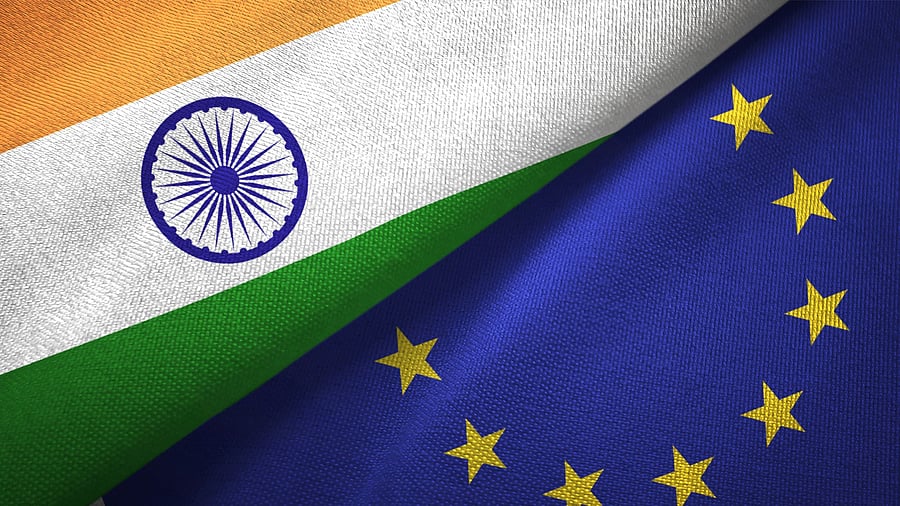
The flags of India and the European Union (EU).
Credit: iStock Photo
New Delhi: The European Union-India relationship is on an "ascending trend" and the two sides represent for each other a "safe investment" at a time when trade, technology, migration and information are being "weaponised", EU Ambassador to India, Hervé Delphin said on Thursday.
At an interactive session here, he also described the "historic visit" of President of the European Commission Ursula von der Leyen and the EU College of Commissioners to India in February as "a vote of confidence and trust in this relationship with India".
On the EU-India FTA talks, the envoy said that "a tall order and direction" have been intimated by the two leaders from both sides to the negotiating teams. India and the EU have committed to conclude the ambitious EU-India free trade agreement (FTA) by 2025 end.
The FTA can be sort of a "turbocharger" of the economic cooperation, the envoy said.
"There is a clear statement on both sides that not a single issue will block the whole lot. We will go ahead," he said in response to a query, without elaborating.
On the EU-India ties, Delphin said the relationship is "clearly on an ascending trend," adding the 27-nation bloc is a "unique construct", even for Europeans, to navigate that reality, which is "sui generis" (of its own kind).
People understand that the EU stands as a "collective force" in today's world, the envoy said at the event organised by strategic affairs think-tank Ananta Centre.
Delphin mentioned that it was "interesting to see how global powers such as Russia, China and the US put a focus on the EU, and not necessarily in positive terms".
"But, it probably means that we matter. So, they may deride us, may challenge us, may undermine us, but it means that we matter, otherwise they will not take the pain and time in focusing on us... We are a collective force with Member States altogether," he asserted.
On EU-India ties, Delphin said, they both stand as "cooperative partners" committed to a rules-based order.
This partnership, which has "grown organically" has generated benefits, the envoy said.
"When you see how investment, trade, technology, migration, energy, and information are being weaponised, we represent for each other a safe investment. I think this has grown in the minds, this intersection of our economic, political and security interests has simply grown." Delphin said it was about how the EU-India partnership can "deliver mutual benefits, not just for two of us, in a win-win (way), but also what it can bring for the world, especially in times of this turbulence".
He also underlined that in this context of geopolitical and geo-economic dynamics, "for us, the environment has never been so conducive" for a " strong strategic partnership".
"As a partner of choice and as a partner for necessity. We both stand to benefit from that relationship. There is indeed an untapped potential, and maybe this is a time to deliver." Referring to the recent ASEAN Regional Forum, he said it was to boost trade and connectivity, and how to "accelerate digital transition and green transition".
"I would say in the stock market of strategic value, the EU is up. Definitely it's up, that way puts more pressure on us. I think we should seize the moment," the envoy said.
He also referred to Brexit, saying, "We had to digest or manage a divorce with the UK. It was clearly a negative-sum game. No one in Europe... was for the UK to be out of the EU. Now, you see the mood in the UK, the timing was sort of, in retrospect, probably not good, neither for the UK nor the EU." "And, of course, Trump 1, followed by Trump 2, that certainly brings a host of challenges in the relationship. But, somehow, we managed to navigate that... all the series of crises," he added.
Delphin remarked that the EU often tends to be "written off", but he asserted that it was a collective force.
"So, what you see unfolding is what I call the 'rearmament' of the EU. The military rearmament... societal rearmament, defending our democracy, increasing the resilience of our societies, and of course, the economic rearmament. We made our own journey through that, realising we need to increase our resilience and strategic autonomy." "We are readying ourselves to the new normal... that we have changed fundamentally our DNA... we remain an open society, a democratic society. But the difference is that we don't want our openness to be turned into a vulnerability, and turned against us. We don't want this interdependence being weaponised against us," the envoy underlined.
On the visit of the President of the European Commission to India, he said it was a "strong political message", and the sense that "we need to invest more".
Referring to von der Leyens's keynote address during the visit, Delphin said, "She had said that it is a 'consequential partnership' not just for the EU and India, but also for the rest of the world." The EU and India are positioning themselves as "bridgeheads for large coalitions", to develop common initiatives and there are not so many ready to shoulder that role, he said.
"We both reject wars of aggression. We both reject global terrorism. We reject economic coercion. As large democracies we attach a central place to human values and human-based or human-centric development including in technology. Both sides, see each other as an important pole in a multi-polar world," the envoy added.